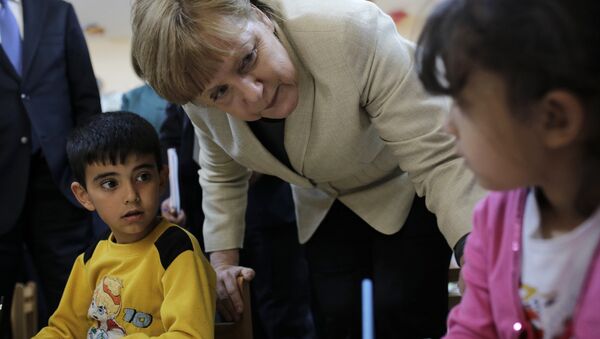The leaders of the Christian Democratic Union and its Bavarian sister party, the Christian Social Union, in the federal and state parliaments plan to introduce "value lessons," or so-called "rule of law classes" in schools for refugee children across Germany, according to the newspaper Rheinische Post.
The outlet cites a proposed resolution, which is expected to be adopted at the conference of the CDU/CSU leadership, who meet in Frankfurt am Main on May 7. The party leader, German Chancellor Angela Merkel, is also slated to attend the meeting. The conference will address integration and refugee policy.
"The integration of those who could stay in Germany is a priority, not in the least to preserve social peace," the project, cited by the paper, reads.
The draft precisely states that constitutional norms, such as the respect for human dignity, the free democratic order, the freedom of expression and the press, the state monopoly on force and the equal rights of men and women are "indispensable values, standing above cultural or religious diversity."
The initiative names learning the German language and values an "indispensable condition for successful integration.” The proclaimed goals of these classes are to help refugees orient in the system of German values, the rule of law as well as cultivate “limits and obligations of the German constitutional state."
READ MORE: What it Means to be Swedish: Minister Wants Migrants to Learn 'Swedish Values'
The idea was initially brought up by Bavarian State Head Markus Söder from the CSU and by his colleague from the state of Hesse Volker Bouffier from the CDU. The latter advocated the plan in the interview with Spiegel, stating that a similar, two-year integration project in refugee centers had been “very successful."
"That is why we want to use this experience and expand the classes in the new term," Hesse’s state head told the media.
Tougher Stance on Migration
The initiative has come amid heated debate around the stance on the migration policy in the new coalition government that the CDU/CSU formed this March with the Social Democratic Party (SPD), which has to deal with the recent mass influx of asylum seekers.
Germany’s new Interior minister Horst Seehofer, the former head of state of Bavaria, known for its independent stance on federal issues, has been in the spotlight for his strong position on the migrant issue.
Shortly after taking office, in an interview with the German newspaper Das Bild, he said, "Islam doesn't belong to Germany." The remark triggered fierce debates within the country.
READ MORE: One in Four Migrants to EU Drop Out of School Early
It’s been also reported that he plans to introduce new restrictions for family reunions of refugees. Under new rules, discussed by the parliament, only spouses, parents of underage children and underage unmarried refugees will get permission to immigrate to Germany.
The restriction will also affect the recipients of social benefits such as the Hartz IV program, as the proposed law states that family reunification can be refused for those who depend on certain types of allowances “for supporting other family members or other members of the household."
The German Parliament had approved reunification entry for 1,000 families monthly, which was suspended until August 2018 in 2016, according to the grand coalition agreement between CDU and SPD, who was initially against capping the number of asylum seekers and in favor of ending the freeze on family reunions. The right-wing Alternative for Germany Party (AfD) who, in a historic move, took third place in the 2017 Parliamentary election with demands for a stricter refugee policy, has been promoting a cap on all immigration and the closure of the German border.



